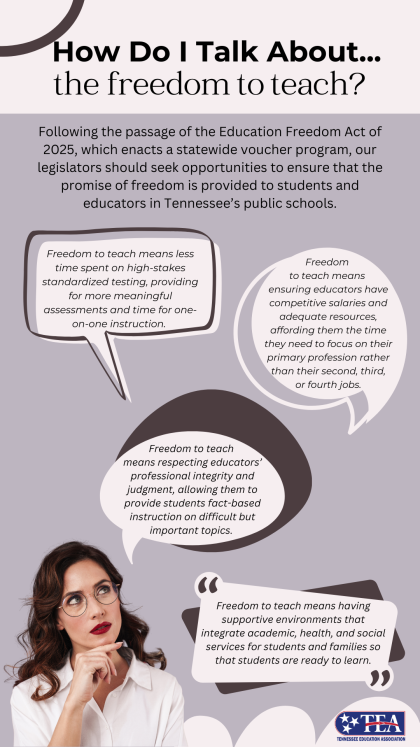Freedom to Teach Bill Seeks Sweeping Law Changes

A bill has been introduced this legislative session that would make several significant changes to public education in Tennessee.
HB675/SB415 (Cochran/Lowe) aims to substantially reduce student testing in Tennessee, adding more time for teachers to focus on instruction rather than test preparation.
“Freedom to teach is critical to student success and educator morale,” said TEA President Tanya T. Coats. “For too long our public education system has been over-reliant on high-stakes standardized testing, and this legislation takes an important step toward letting teachers teach students, not the tests.”
The proposal would reduce TCAPs and end-of-course tests to the federal minimums required under the Every Student Succeeds Act, also known as ESSA. Sponsored by then-Tennessee Senator Lamar Alexander, the 2015 law replaced the much-maligned No Child Left Behind law, which created burdensome federal mandates around high-stakes tests and punitive accountability measures.
ESSA was seen as returning authority over public education back to the states and away from the federal government.
However, following the passage of ESSA, Tennessee under former governor Bill Haslam chose to not take advantage of the newfound flexibility around assessment and accountability, opting instead to enshrine current practice in its state ESSA plan.
The new proposed legislation would require Tennessee to submit an amendment to its federal plan and take advantage of the ability to greatly reduce standardized testing in public schools.
Students would still be required to take annual TCAPs in math and ELA in grades 3-8 but would take grade span tests in science and social studies. Science would be tested once in elementary, middle, and high school, while social studies would be tested in middle school. All other end-of-course tests for high school would be eliminated except for math in the ninth grade, while the ACT would be required to be taken in tenth and eleventh grade.
The bill also reduces the number of screenings the state requires under the Response to Instruction and Intervention framework. Students in grades 4-8 would only require screening if they were classified as “at-risk.”
Other major components of the law address teacher evaluation and tenure. Educators and principals scoring a 5 on their LOE wouldn’t require another evaluation for three years, while those scoring a 4 wouldn’t require one for two years. Those with a 3 wouldn’t require one for another year. Those who received a 1 or 2 would still require an annual evaluation. The tenure law would be changed to reflect this schedule so that teachers whose scores didn’t require an annual evaluation would be able to use their most recent evaluation if it achieved a 4 or 5 rather than requiring consecutive scores in the final two years of their probationary period.
“In addition to creating more time to teach, this bill makes common-sense changes to our evaluation laws,” Coats said. “This means more time for our administrators to be instructional leaders rather than waste time evaluating teachers they already know to be effective.”
The bill has been referred to the K-12 subcommittee in the House, where Rep. Kirk Haston, the committee chairman, has long sought reductions in state-mandated assessments. It has been referred to the Senate Education committee, where its sponsor, Sen. Adam Lowe, is a new committee member this year. Educators are encouraged to contact their legislators to express support for freedom to teach and the other important concepts in HB675/SB415.
